FAQs on Guppy Diseases: Diagnosis
FAQs on Guppy Disease:
Guppy Disease 1,
Guppy Disease 2,
Guppy Disease 3,
Guppy Disease 4,
Guppy
Disease 5,
Guppy Disease 6,
Guppy Disease ,
FAQs on Guppy Disease by Category:
Environmental,
Nutritional (e.g. HLLE),
Social,
Infectious (Virus, Bacterial, Fungal),
Parasitic (Ich, Velvet...),
Genetic,
Treatments,
Related Articles:
Guppies,
Poeciliids: Guppies, Platies,
Swordtails, Mollies by Neale Monks,
Livebearing Fishes by Bob
Fenner,
Related FAQs:
Guppies 1,
Guppies
2, Guppy Identification,
Guppy Behavior,
Guppy Compatibility,
Guppy Selection,
Guppy Systems,
Guppy Feeding,
Guppy Reproduction,
Livebearers,
Platies,
Swordtails,
Mollies,
|

|
|
Guppy colony issues 4/17/20
Hi Neale! Hope you are well
<All good, thanks.>
So everything seems to of improved and no more deaths so far
<Good-oh.>
Only issue was my male guppies fin is damaged again and I'm not sure who or
what is causing it
<Could be one of the other fish, an excessively strong filter, and/or
bacterial Finrot, though this latter should usually be apparent because
most/all of the fins will be raggedy around the edges. If it's a filter or
aggressive fish problem, what you tend to see is clear tears in the fin
membrane, often only on the tail and/or dorsal fin if another fish is to
blame.>
There is 1 adult male guppy in with about 25 females and maybe a 2 young
juvenile males. His fin was fine yesterday and overnight its gone bad again
even worse than before. Is it possible overfeeding caused it or is my
females bullying him?
<Yes, females can be nippy, but it's rare.>
Should I move him?
<I would not.>
Or Remove some females? Or something else?
<I would double-check the tank is sufficiently big and filtered for all the
fish you have. For a colony of twenty-odd Guppies, you'd want something like
90-130 litres (25-30 US gallons). Water quality should be tested, and
there should be zero ammonia and nitrite. If you're only keeping Guppies,
adding a little salt can be beneficial, especially if your water is soft.
But certainly make sure the water is nice and hard (10+ degrees dH, pH
7.5-8.5). I'd medicate as per Finrot (but avoid unreliable cures like
Melafix) and remove carbon, if used, while medicating.>
Oh here's a picture of him before and after the damage (he's doing a poop in
2nd pic and it was night)Thanks!
<Welcome. Neale.>
|
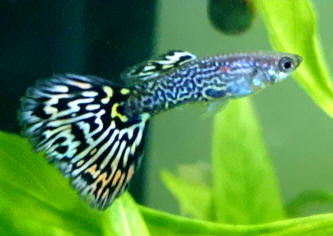 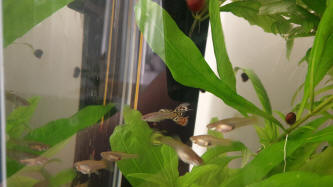 |
|
Re: Guppy colony issues
4/18/20
Thanks so much Neale,
<Welcome.>
I medicated them again with Prazi per the instructions.
I notice his tail is whitish on the ends does that make fit rot or nipping
more likely?
<Finrot. But the two are often linked. When the tissue is damaged, any dead
tissue goes white. If blood vessels become congested, they may turn pink or
red, and this is often a good sign you're dealing with Finrot. Because
repeated nipping makes fish vulnerable to bacterial infections, there's a
link with Finrot (which is a purely opportunistic, and not a disease that
you can stop from getting into a tank).>
Its 70L I was supposed to sell or give away half of them but couldn't due to
corona virus.
<Understood. Do keep on top of water changes, do ensure aeration is good,
and do avoid overfeeding.>
I could remove all or most of the rams snails to help as there is a lot. I
add rift lake cichlid salt to the tank
<Snails won't make much difference so wouldn't be too bothered about them.
Cheers, Neale.>
|
|
Sick guppy - black spots
3/6/19
Hi guys,
<Hello Luciana,>
Could you please help me?
<And if you could help us, too, by not sending 18 MB of photos! Such big files
fill up our email mailboxes, causing other people to have their messages bounced
back. Some of us travel around the world and rely on using phones or modems to
access the Internet, and it goes without saying that
big files really cause problems in that situation.>
I was reading through the conversations you published, but I thought it would be
better to ask directly.
<Sure thing.>
I have some guppies living in a planted aquarium. I've done a water change 2
days ago and yesterday I noticed one of my white guppies had his tail crumpled.
I went to check the parameters and they are fine (no ammonia, nitrites,
nitrates), the pH has changed a bit, and the temperature, due a change on the
water dropped a bit ( I live in Brazil, so it was quite hot, and now the
temperature dropped, so the aquarium has went back to the usual 26 Celsius).
<Guppies are adaptable, but they dislike soft, acidic water chemistry. So when
you say the pH has changed, do you mean down? A steady pH around 7.5 is ideal
for Guppies; anything below 7 tends to cause problems, at least with farmed
'pet' Guppies. There may well be wild populations living in softer, more acidic
water conditions.>
The aquarium is heavily planted (and I use dirt under a layer of 1. 1/2 inches
of black basalt).
<Sounds fine.>
I do not know if the last change disturbed the soil or something else, but
anyway, my white guppy got black spots. I've checked the other fish and they
seem fine, but this guy was very upset since the change, so I'm guessing he is
the only one affected.
<Indeed. The two commonest explanations for black patches are these:
Firstly, exposure to ammonia. This causes chemical burns, and the dark patches
reflect that. The second is sometimes called Black Spot Disease, and it is
caused by a parasite that occurs in ponds and other environments where its
complex life cycle is viable. Neascus is one such parasite; there may be others.
Because their life cycle needs snails and/or birds, this parasite never lasts
for long in aquaria. But in ponds it may persist for a while, infecting healthy
fish.>
Besides the spot on his back and had, he had one on his tail too. I believe it's
a fluke, but since I did not know for sure, I made a blue Methylene dip of 10
minutes with him
<Methylene Blue is mostly for fungus, and doesn't really help much with anything
else. I'm skeptical of a fluke, but since your photos are after the dip, it's
hard to be sure. Flukes are very varied, and difficult to
identify without a microscope. Praziquantel is the most popular option for
treating Flukes, though other antihelminth medications may work better. Often
you need to use several treatments for a complete cure.>
He was not happy, but then went quiet. After the dip, I notice that some of the
spots turned vivid red (I'm guessing it's a sign of blood) and he was very
prostrated for one hour. Now he seems better, he has eaten, but he still have
some black spots.
The pictures are from after the dip.
Could you please help me? And if you can, please tell me what I should do to
prevent other fish to get sick.
Cheers,
- Luciana
<Hope the above helps. Cheers, Neale.>
|
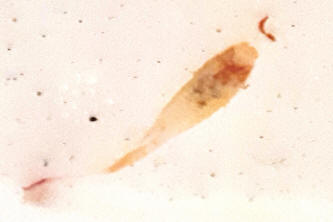 |
|
Re: Sick guppy - black spots
3/7/19
Hi Neale,
<Luciana,>
OMG, I'm very sorry for the photos sizes! I've forgot to change it. Wont
happen again.
<Cool.>
Actually, the pH went a bit up, from 7.2 to 7.4, my tap water is alkaline.
And as for ammonia, I check the parameters one per week, 2 days before the
water change it was normal (by normal, I mean less then 0,25).
<You do want zero. Any ammonia is bad. Check your tap water. Sometimes this
has ammonia in it. Use a good water conditioner to neutralise this.>
Uhn, I have some Ramshorns on that aquarium, they were acquired in a store.
They are there before the fish (this particular one is with me for 2 months,
the snails are with me for 4, I guess - I have the red, and I wanted the
blue ones).
<Should be harmless.>
Thank you a lot for your considerations. Is there any "soft treatment" that
you would suggest in his case? He is quite stressed, and I would not like to
go with treatment since is not possible to know if it might not be a fluke.
<If the fish is happy and feeding now, I'd not treat with anything. If you
are only keeping Guppies, you could add some salt, maybe 2-3 gram/litre.
This will help recovery.>
And thank you for your time :)
<Welcome.>
Luciana
<Cheers, Neale.>
|
Guppies with PopEye 1/8/19
Hello there!
<Hi Megan, Earl this morning.>
I have an unusual issue. I have several (ha ha, a million really) guppies that
were born and raised in my home. These little ones range in age but most are
about 5 to 6 months old. They are in 2 separate
tanks, boys in our 55 gallon community tank (once they can be sexed anyway) and
the ladies and babies in the nursery, which is a 29 gallon. The 29 is guppy
only, besides 2 Amano shrimp, 2 bamboo shrimp and a large apple snail, as well
as some Ramshorns. The 55 is mostly white clouds, Danios, and male guppies. Both
are well established planted tanks with sand substrate. Water is almost the same
for both.
The 55 has PH 7.2, ammonia 0, nitrate 10 ppm, nitrite 0, KH 3 and GH 8.
The 29 has the same except slightly higher nitrate at 20 ppm.
<Seems good. I would look into the other possible causes as shown here:
http://www.wetwebmedia.com/fwsubwebindex/fwdistrbshtart.htm and
http://www.wetwebmedia.com/fwsubwebindex/fwpopeyefaqs.htm . My first step
would definitely be to quarantine the fishes in question, then observe all of
the guppies for behavior that could lead to eye trauma. Sit by the tanks and
watch them for at least 30 minutes particularly during feeding when an
aggressive, larger fish would be more likely to "act up". My hunch is that it's
bacterial but don't rush for antibiotics until you have done this much. Only
then is it time to treat them with medications, administered as per WWM's pages
regarding this. Hope this helps (and please do follow up by sending us an update
as to your outcome as this can immeasurably helpful to others down the road).>
About a week ago, I noticed that one of the oldest baby ladies had PopEye.
It was just one eye and after reading up on it I assumed it was from trauma and
started watching her more carefully. Since I had a bunch of them in there along
with babies I was concerned. I had a LOT of females and I decided to give about
10 ladies away to the LFS so there could be more room for babies. While catching
them I found another lady with PopEye.
Strangely it was only one eye, same eye even. These ladies are from the same
batch of babies, they look pretty much identical. And then I found another. So,
that's 3 identical females at the same age with PopEye in one eye, all on the
same side (the right). Really weird. Put them in quarantine.
Meanwhile, in the community 55 there is a young lad, just old enough to know
he's a male, with PopEye only on the right eye. It developed overnight since I
am now carefully watching the remaining guppies for anything unusual. His is
worse than the others.
Anyway, my question is could this be hereditary? Why all the same eye? Why not
both eyes, or any of the other fish? I have scoured this site and the internet
but it seems PopEye is kind of a mystery illness. Is it even possible for it to
be hereditary? I just think its very strange that it's not both eyes on any of
them if it is a water quality issue. Plus they are in separate tanks. The male
(most likely he's inbred) did come from the 29 of course, but he's been in the
55 for over 2 weeks now. My water is consistent and we are diligent with water
changes weekly on all of our tanks, we have 5. Thank you in advance!
Megan
Re: Guppies with PopEye 1/9/19
Thanks for the response. I had read through both of the pages you linked for me
before I emailed but nothing there about multiple related animals getting PopEye
only in one eye and all on the same side.
<I wouldn’t put much stock in that detail, if any. 50/50 chance after all.>
When I feed them occasionally I will give Sera O-nip which is a food pellet that
sticks to the glass. Its about 12mm in size. That would be a time when they
could injure each other while feeding. They do love that kind of food!
I love watching them and observe them every time I feed them. They are in our
living room and they are our TV! I never notice them nipping each other while
feeding. Tonight is a fasting night for them so I will have to watch tomorrow.
<Fasting night?>
One of the bamboo shrimp in the 29 died while I was at work today. The baby male
guppy has a white fungus on the PopEye now, and a female guppy that doesn't have
PopEye has fungus on a fin. Its hard to tell but it is white colored and fuzzy.
Looks the same as the stuff on the males eye. All fish in the 55 look good. No
other new issues.
The quarantined fish spent most of the first day up at the surface. No gasping
for air, just lethargic and almost sleeping for hours after i put them in. Now
they are moving about more but the female with fungus is still lethargic.
Parameters are the same for the quarantine tank as the others. A bare bottom 10
gallon, a hob filter with carbon and a small sponge filter.
All of my tanks have a sponge filter as well as a hob.
<This screams “infection”. Sponges present a dilemma in that they can’t be
replaced hastily yet that means they are not quarantined.>
In the 29 gallon the substrate is Carib-sea river of doubt and also Carib-sea
Tahitian moon sand, mixed. We had this in a cichlid tank previously. We had a
mass die off of the young yellow labs that were in
that tank from a mystery illness. Some of them acted as if they had seizures
occasionally. Some had no symptoms, but just died.
<Red alert! I’d ditch this substrate pending the outcome of the 10g tank. Remove
and bleach (“nuke”) decor, rocks, gravel, the works if this illness continues.>
None had PopEye. This sand sat in a bucket for about 2 months before it was
washed and then used in this tank. My boyfriend thinks its the sand.
<I am inclined to agree. Either way it’s not doing you any favors.>
I'm just stumped. I guess it must be coincidence that it is on the same eye for
all of them, but not both. I'm not sure what to treat them with.
Megan
<WWM has info regarding this. Typical antibacterial medication. It is also worth
considering where you have gotten all these animals. Some have surely cone from
outside sources which may be suspect.>
Re: Guppies with PopEye 1/11/19
As for fasting night, i don't feed them every day. Usually every other
day.
Is this wrong?
<Hi again. Ideally you would want 2 small daily feedings or more simply, once a
day unless you have a special reason.
Certainly better to underfeed than to overfeed as a general rule but I'm not
sure why you'd skip feedings normally.>
I'm not sure what you mean by this statement "Sponges present a dilemma in that
they can’t be replaced hastily yet that means they are not quarantined."
Do you mean I shouldn't have a sponge filter in the quarantine? The one in the
29 has been there a long time. The one in the quarantine is pretty new.
<Simply that sometimes people set up a QT but bring decor or sponges (for
cycling) from another tank,
which defeats the purpose of quarantine, which is to be completely clean and
uncontaminated.>
I'm really surprised about the sand. I am not excited to throw out $60 worth of
sand but I'll just have to if i want healthy fish. We have the same sand in our
5 gallon Betta tank. Guess that's going bye bye too. He says its cursed sand. He
was right!
<Well it's not a 100% surety but you should consider: how long was this stuff
sitting, damp, in a bucket (probably dimly lit), how clean could it really be
and who knows what's gone on in there? It sucks to lose the money and the nice
sand, but ask yourself what $60 is compared to the value of the other gear you
pay for, the electricity, the food, and the animals themselves. A proverbial
drop in the bucket.>
So far they are ok, the small male still has fungus on his PopEye. Will treat as
directed. Thank you so much for the advice! Megan
<Please do let us know how it goes!>
|
If you look at my guppy you will see that their is something white
coming out of its butt. 7/6/16
<Ah, the "texting" generation, bless them! Outgrown pleasantries and politeness
-- no need to say hello, please or thank-you; straight to the point!>
What is it?
<Likely an anal prolapse rather than a parasite. Do read WWM regarding these; a
combination of Epsom salt, fibre-rich diet, and appropriate antibacterial
medications can/should help. Cheers, Neale.>
More texting 7/6/16
Sorry that I got straight into it ha-ha I was really worried that it was a
parasite
<It's not. Some good examples here...
http://www.wetwebmedia.com/fwsubwebindex/cichliddisfaq4.htm
Epsom salt, fresh greens, and ideally some antibacterials will do the trick.
Cheers, Neale.>
|
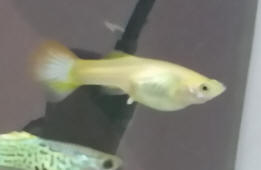 |
See-through and swollen abdomen 5/28/15
Hi there guys,
I have a fish tanks that have both male and female guppies. I have double the
amount of females to males so that there is no fighting and to try give the
females a rest.
<Cool.>
They have fry but I give what survives away. Yesterday I noticed that
one of my females abdomen's is blown up hugely. It is almost like
someone has pumped her up with a bicycle pump, it is also completely see
through.
<Sadly rather common. Difficult to pin down. Can be constipation (in which case
Epsom salt helps) but can also be infection (treat as per Dropsy, again Epsom
salt, ideally with an antibiotic) or, most seriously of all, dead/decaying
fetuses (no real cure, and would euthanise such fish as they'll die anyway).
This last condition is sometimes associated with protrusions from the vent. Do
see my pictures of a (dead) female Halfbeak on this page:
http://www.wetwebmedia.com/fwsubwebindex/halfbeakfaqs.htm
While not a Poeciliid livebearer like your Guppies, the basics are the same.>
This means I can literally see the other side of the tank through her poor body.
My first thought was that it might be bloat/swimmers balder but she doesn't seem
to be having any trouble with swimming.
<Do try the Epsom salt treatment as a "first pass"; do read:
http://www.wetwebmedia.com/fwsubwebindex/SaltUseFWArtNeale.htm
...towards the end of the article; and also:
http://www.wetwebmedia.com/fwsubwebindex/dropsyfaqs.htm
Dropsy is sometimes treatable, but not always.>
She neither sinks nor floats nor looks like she is struggling at all. She is
also not off her food and still seems to poop with no problem. I have been
keeping a close eye on her. I also watched to see how the other Guppies are
treating her in the tank and they don't seem to be picking on her or treating
her any differently. If it was not for the bloated see through body I would
think she was totally normal. Any help you could give me I would be most
grateful! Thanks in advance.
<Most welcome.>
Hannah (A huge fan)
<Yay! Neale.>
|
Bloated guppy
5/12/15
Hi again!! How are you?
<Fine Ms. C; thank you>
One of my male guppies has a very enlarged tummy. He feels in good form, eating,
swimming etc. but is quite big. I think it's dropsy as I have been busy and have
not changed the water tank in like 6 weeks. I also have far too many fish (being
trying to give them away) 10 gallon tank - 9 guppies I took him away on a 2.5
gallon tank, put about 3/4 teaspoon of Epsom salt
and same amount of salt.
<Good>
I changed 50% of water on main tank and added regular salt to it. I think one
other fish may have it but his tummy is not crazy big so it may not be.
Is there anything else I should do? I have some tablets for fungus and bacteria
- should I use that?
<I would continue with the Epsom salt treatments, replacing as you change water
(I'd use the water from your ten gallon for change outs); and not treat either
system as yet (more potential trouble than it's worth)>
Thanks a lot!!!
C
<Welcome. Bob Fenner>
Re: Bloated guppy 5/13/15
Thanks! how often do I change the water on the isolation tank?
<I'd likely do (from the main tank) every two-three days>
and how much Epsom salt and aquarium salt shall I put?
<About a level teaspoon for the 2.5 gallons>
Should I replace the water I take from the main tank with new water plus salt or
just new water?
<The latter; just new water. Bob Fenner>
Re: Bloated guppy 5/13/15
Thanks! Fish still alive - eating well too
<Ah, good. B>
Re: Bloated guppy
5/13/15
So I change the whole water for the isolation tank?
<I'd only change half at most>
Re: Bloated guppy 5/19/15
Hi!
<Hello there>
The fish is still alive, eating well, moving well but still baloney :) I have
done the water changes with Epsom salts twice - how long until he goes back to
normal ?
<Mmm; could be days, weeks; perhaps forever. The bloating may be due to
something incurable. I'd keep on doing what you're doing. Bob Fenner>
|
 |
|
Re: Bloated guppy 5/20/15
Thanks Bob. I will keep giving him eps salt baths - at what point in time will
be safe to put him back on the main tank!
<Is safe anytime. B>
|
Guppies Keep Dying Not Sure Why
11/11/14
I have a 28 gallon tank. The gph of the filter is about 350.
<350/28 is 12.5, so a turnover rate of 12.5. Even allowing for the
filter being a bit clogged, this is a very high turnover rate. Good for
loaches and catfish, but too much for Guppies.>
The water ph is 8. The ammonia, nitrates, nitrites appear to be fine.
<Values would help. To recap: ammonia and nitrite must be zero. Nitrate
should be low, under 40 mg/l.>
The tank contains 3 female guppies, 5 neon tetras, 3 ghost shrimp, and
numerous tiny bladder snails. I clean the tank once a week. Is this
enough?
<Ample.>
I cleaned the filters a few days ago. This did not seem to help. The
problem is, the guppies sit at the bottom of the tank, appear slightly
bloated, then start swimming again, and then they die. What do you think
the problem could be? Do you think it could be guppy disease?
<Have written about "Guppy Disease" (strictly, Tetrahymena) elsewhere:
http://www.fishchannel.com/fish-health/freshwater-conditions/guppy-disease-tetrahymena.aspx
But to stress the key point: Guppies are inbred and genetically weak,
and the quality of farmed specimens is low. It's essential to choose
healthy specimens, to keep them in optimal conditions (hard water for
example,
which Neons won't tolerate for long) and ideally with some salt added
(not essential, but helps greatly). Tetrahymena has similar symptoms to
other diseases especially Mycobacteria infection, so keep an open mind.
In both cases cure is largely impossible, but prevention (careful
selection followed by optimal conditions) should prevent problems.>
Thank you.
<Most welcome. Neale.>
Re: Guppies Keep Dying Not Sure Why 11/11/14
Thank you Neal! :)
<Most welcome. Neale.>
|
Strange white spots/cotton mouth? on my Platys and Betta; plus
broken link
> I tried looking at the article mentioned on
>
http://www.wetwebmedia.com/before/index.htm
> 'The vast majority of times fish get sick, the disease involved is
> Whitespot, velvet, Finrot, fungus, or the shimmies. Use this article to
> establish which disease is causing your problems, and then select the
> appropriate treatment.'
> Unfortunately when I click on 'this article' I get a 404, same with
> 'select' so hopefully this email wont be too out of place.
> <Thank you for this. Will take a look/see>
> A quick history, I'm new to aquarium keeping, and had thought things were
> pretty settled out when I went out and purchased some additional fish and
> plants for my 50G/200L tank. The day after putting the plants in (rinsed
> in RO water, but guess not good enough) I found all of my shrimp upside
> down on the bottom of the tank, some floundering around.
> <? What from the plants themselves would cause this?>
> I panic'd and added too much Tetra Aqua Safe (Water/metal treatment) which
> allowed a few of the shrimp to recover, but then caused havoc with the
> fish. I did man water changes over a week and also upgraded the HOB filter
> that came with the tank to an Eheim Ecco pro canister. After a week of
> trouble things appeared to be as good as ever with happy fish swimming
> around. During the challenging time I lost one of the new platys and one
> of the new guppies I had bought for the tank.
> <Mmm; how long has this tank been set up? Best to let all run a week or
> more before introducing any life... then allow the system to become
> established in terms of cycling.... before stocking more>
> A week passes and yesterday I look at my tank and find my Betta with a
> funny gray/white chin/mottled blue face instead of the black it has been.
> The other new platy I bought a few weeks ago has a funny white fuzzy stuff
> on his mouth, and now I'm anxious it might be Columnaris that will wipe out
> my tank.
> <May be... but...>
> I've isolated the platy and Betta to another smaller tank but now in
> looking closer at my other fish I am seeing little white spots that almost
> look like paint on some, and I *think* maybe holes or skin damage on the
> other platys. Unfortunately I'm too new to this to really know if what I'm
> looking is normal fish anatomy or something going horribly awry.
> <Just stress... from the system being new, water quality issues>
> Here's a 2 second video of the platy with the funny mouth
> https://www.youtube.com/watch?v=pfQ56mRgdzY (I couldn't get a photo
> unfortunately)
> Here's a few photos of the platy, Betta and guppies. Would love if you
> could tell me if I'm hallucinating or if everything is ok? I keep reading
> about a specific antibiotic Kanamycin but have no idea how I can get it
> here in the UK ?
> <Am going to ask Neale; who lives in Britain... for better input here>
> Anyway, thank you very much for any insight you can provide!
> -Crh
> <I encourage patience, and no medicine introduction at this juncture. Your
> fish's troubles are not likely pathogenic, but environmental. Treating may
> well make matters worse. Perhaps a good general freshwater book to read for
> now.
> Bob Fenner>
Re: Strange white spots/cotton mouth? on my Platys and Betta
<<Bob’s covered the basics, but some thoughts. Excess mucous production and/or
poor mechanical filtration (i.e., removal of silt rather than ammonia) can cause
fish to appear speckled out cloudy even though they’re not sick. Replacing the
mechanical filter media, checking for an irritant (such as copper or
incorrect/sudden changes in pH), and the use of flocculants (sometimes called
filter aids) can help. A series of large water changes is usually helpful where
there are large quantities of silt, together with stirring/cleaning the
substrate. Second though is the use of salt to stress freshwater parasites.
While not an option for the Betta, you can easily up the salinity to one-quarter
seawater and cause livebearers such as Platies and Guppies no harm at all. This
will severely stress most ectoparasites (velvet, ick, even Costia) and to some
degree can even help with bacterial infections (particularly where these are
opportunistic). Mouth Fungus (the bacterial infection Columnaris) is always a
possibility, though it is relatively easy to treat as per Finrot if caught
early. Antibiotics such as Kanamycin cannot be legally obtained in the UK (or
indeed most Western countries outside the US, and even in the US the
free-for-all on antibiotics isn’t likely to persist for much longer; do see the
issues with antibiotic resistance). However, you can obtain them from vets,
typically for around £10-15, which is about 2-3 times the cost of generic
aquarium treatments here. With that said, a product called eSHa 2000 is
generally excellent against bacterial infections, much better than the other
antibacterials I’ve used here (the Interpet one for example I’ve never had any
success with). eSHa 2000 costs about £4-5 a pot and is very economical to use.
It, and eSHa EXIT for external parasites, are the only two medications on sale
in the UK that I use or recommend. Cheers, Neale.>>
Re: Strange white spots/cotton mouth? on my Platys and Betta
<<The Platy in the video looks like he’s damaged his mouth, got some dead skin
there, but isn’t otherwise in trouble. If he can feed okay and is swimming
about, I’d not worry overmuch. I’d look out for opportunistic infections, such
as fungal infections, but good water quality (hard, alkaline chemistry too)
should be all he needs. Low-end brackish conditions tend to minimise fungal
infections, so if he’s in an all-livebearer tank, 3-6 gram/litre salinity could
help. eSHa products widely sold; your local Maidenhead Aquatics for example
should stock and be open Sunday. Cheers, Neale>>
Re: Strange white spots/cotton mouth? on my Platys and Betta
From the plants I believe it was pesticides used to keep snails/etc.. off them.
<Strange>
The tank has been setup for 6 weeks ish, ammonia is 0, nitrite is 0, nitrate is
about 5-10.
Changing roughly 25% water once or twice a week and using (now) SeaChem prime to
condition.
Could you see anything from the photo's or video that looked odd? Thanks!
<Not really; no. BobF>
-Crh
|
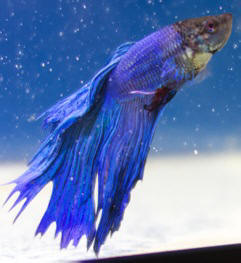
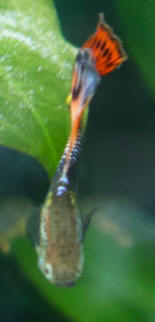
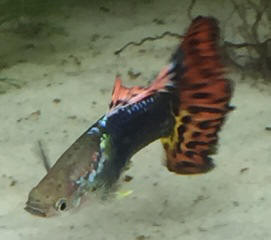

More than full size |
|
Re: Strange white spots/cotton mouth? on my Platys and Betta
10/25/14
Thanks Bob, much appreciated! Many thanks to you and the crew for
helping the rest of us to navigate these new waters, especially when
worried about these new friends it makes a world of difference!
-Crh
<Am very glad for this. Cheers, BobF>
|
|
|

